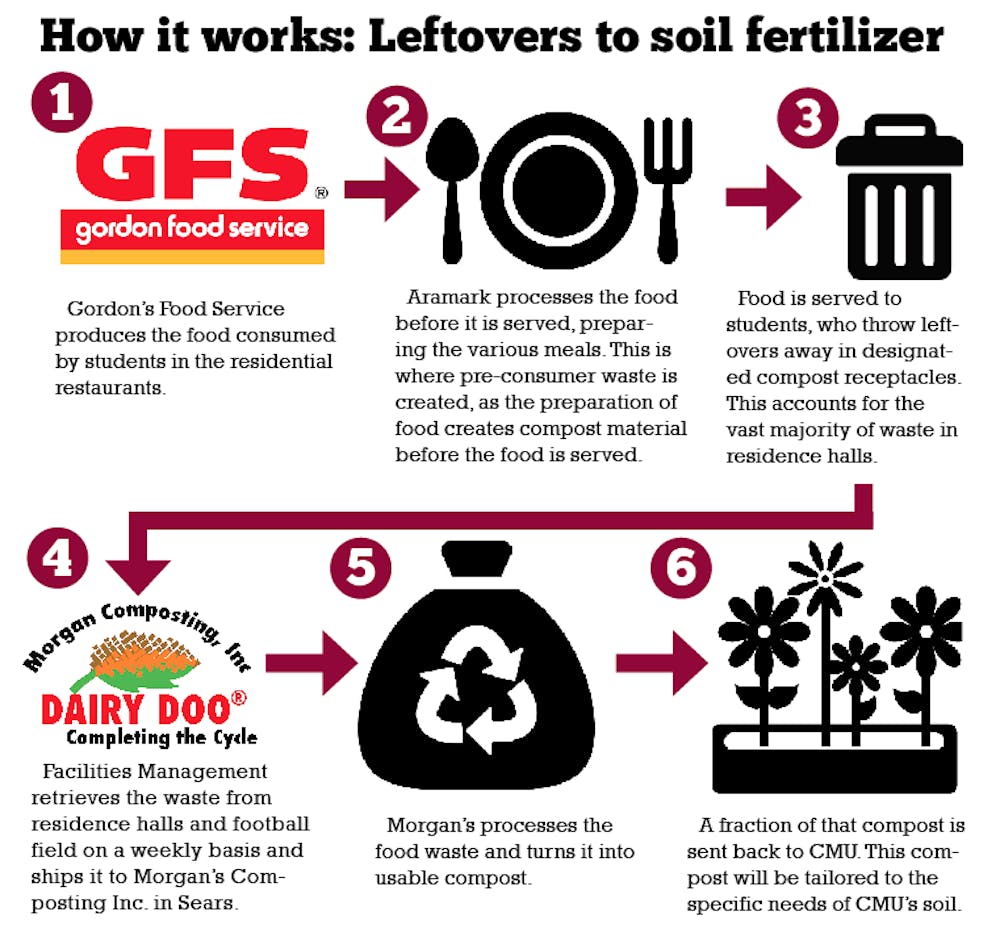Completing the cycle: Food waste turns to soil fertilizer with composting
Food scraps students scrape off plates in residential restaurants will lead to lusher grass and healthier soil around campus in 2016.
Composting has been a project of Central Michigan University since 2009, and has expanded from a pilot program that addressed pre-consumer waste to a fully-fledged program that will use a fraction of its 270 tons of waste for the university's benefit.
In August, CMU began a new partnership with Morgan's Composting Inc., a company that processes diverted waste into usable compost. Morgan's is located in Sears, Mich. and CMU handles the hauling of compost within the university.
"We bought a specially-made trailer from Beck's on 127, equipped with a cart dumper and several 64 gallon carts," said Director of Facilities Operations Jay Kahn. "We pick up food waste several times per week behind residence halls and football games. From Sept. 30-Oct.7 we recovered a total of 23,500 pounds."
This direct method of composting is rare for Mid-American Conference schools, said Director of Facilities Management Steve Lawrence.
"I was at a facilities conference with Midwest schools recently, and out of the 40 or so universities, only five others did composting," Lawrence said.
Recently, CMU has made plans to use its own compost to revitalize soil on campus.
"We can prevent over 200 tons from going to the landfill, and now we may be able to complete the compost cycle ourselves," he said.
The process will involve measurements of soil on campus to determine what CMU's nutrient needs are, Kahn said.
"It's very scientific, similar to what is done on commercial farms," he said.
Kahn described the process as "difficult," yet one that will ultimately benefit CMU without the use of commercial fertilizer.
Morgan's began taking soil measurements the week of Sept. 28. The compost material will be available to CMU next year.
"Diversion" is defined as waste that is recycled or composed as opposed to being sent to a landfill, Kahn said.
CMU actively works to prevent as much waste as possible from reaching a landfill, which may do more harm than good.
Tom Roher, Director of the Great Lakes Institute for Sustainable Systems, often partners with Facilities Management to save energy and resources.
"(Humans) are directly contributing to climate destabilization," Roher said. "Droughts, heavy snows, cold snaps and vegetation dying are caused by waste and pollution."
Recyclemania was created as a result of a sustainability-centered rivalry between Ohio and Miami Universities in 2001. In the years since, a dozen MAC schools, including CMU and Western Michigan University, have entered the environmental fray. This voluntary contest ranks schools based on their recycling efforts.
This year, CMU took 160th overall with a diversion rate of 24 percent at the time of the competition. This amounted to more than eight pounds per capita, with a total of 207,420 pounds of recycled material.
This is possible through CMU's partnership with Aramark, who processes food and assists in composting pre and post-consumer waste. Pre-consumer waste is what must be thrown away before food in the residential restaurants is served to students, and post-consumer waste is what students don't eat.
CMU runs zero-waste kitchens, Kahn said. This is defined as diverting 90 percent or more of waste from landfills.
"Organics X, the hauling company that bought the business from our old hauler Future Organics, was only interested in hauling pre-consumer waste and livestock feed," Kahn said. "You can't sell post-consumer compost to live stock because it has already been contaminated by people. There's very little tonnage in pre-consumer food waste."




